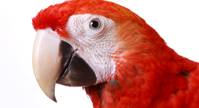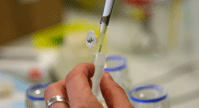Goniodysgenesis and Glaucoma in Border Collies
Description:
Goniodysgenesis is a condition caused by the abnormal and incomplete development of the anterior chamber during eye development. This can result in excessive pressure buildup in the eye. If the condition remains untreated, increased pressure in the eye will eventually result in permanent damage to the optic nerve and will lead to blindness. Because the pressure is so painful and treatments are typically unsuccessful, removal of the eye eventually occurs.
Most forms of glaucoma can be placed into two categories: primary and secondary. The term primary glaucoma is used to describe glaucoma caused by an inherited physical or physiological trait that an animal has been genetically predisposed to. These traits are generally recessive and are passed down from one generation to the next.
Secondary glaucoma is a term that refers to when the disease is triggered by something other than genetics. Things like ocular trauma can cause bleeding, swelling, and inflammation to occur. As the eye heals, scar tissue may form. This impacts the normal drainage of fluid which then results in increased pressure in the eye.
More than 40 dog breeds are genetically predisposed to goniodysgenesis, including the Flatcoated Retriever, Welsh Springer Spaniel, Cocker Spaniel, American Cocker Spaniel, English Springer Spaniel, Basset Hound, Border Collie, Golden Retriever, Leonberger and Dandie Dinmont Terrier. Unfortunately, a majority of dogs affected by glaucoma will become blind in the affected eye within the first year, regardless of medical or surgical treatment.
Symptoms associated with primary glaucoma include: severe pain, sensitivity to light, winking spasms, raised third eyelid, watery eyes, behavioral changes (hiding, refusing to eat), red eyes, dilated pupils, dog wincing when head is touched, and/or when the eye appears to have fallen into the socket.
The discovery of a genetic variant on the OLFML3 gene was done at the Roslin Institute, the University of Edinburgh, and the Mater Research Institute-UQ, Brisbane, Australia. The individuals credited for this work are Kim M Summers, Ailsa J Carlisle, Carys A Pugh, and Lindsay L Farrell. Based on this discovery, Animal Genetics developed an way to detect the genetic variant associated with Border Collie Glaucoma (BCG).
Acceptable Sample Types:
Animal Genetics accepts buccal swabs, blood samples, and dewclaw samples for testing. Complimentary sample collection kits are available and can be ordered at Canine Test Now.
This Test Is Relevant for the Following Breeds:
- Border Collie
Results:
Animal Genetics offers DNA testing for Glaucoma susceptibility in Border Collies. The genetic test verifies the presence of the recessive mutation and results as one of the following:
| G/G | Affected | The dog carries two copies of the mutant gene and is homozygous for the OLFML3 mutation associated with BCG. The dog is very susceptible to developing glaucoma and will always pass a copy of the mutation to its offspring. |
| N/G | Carrier | There is one copy of the OLFML3 mutation associated with BCG. Dog is a carrier and will pass on a copy of the defective gene to its offspring 50% of the time. Be aware that if breeding with another BCG carrier, the litter will be very susceptible to BCG. |
| N/N | Clear | Sample tested negative for the OLFML3 mutation associated with BCG, and will not pass on the defective gene to its offspring. |
Submit a Sample for Testing:
To submit a sample for testing please go to Canine Test Now.
To
order a sample collection kit please go to order sample collection kits.
Cost per sample is $45.00. Please see our Canine Fee Schedule for all test rates.










